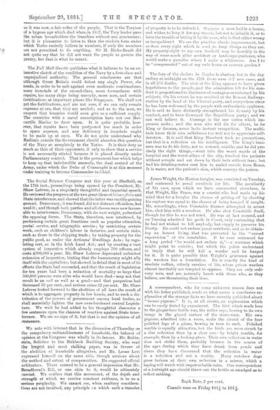The Social Science Congress met this year at Sheffield, on
the 17th inst., proceedings being opened by the President, Mr. Shaw Lefevre, in a singularly thoughtful and impartial speech. He reviewed the progress of the two great ideas of laissez faire and State interference, and showed that the latter was rapidly gaining ground. Democracy, it was found, did not distrust officialism, but used it; and though both parties and all classes were now favour- aisle to interference, Democracy, with its vast weight, pulverised the opposing farces. The State, therefore, now interfered, by performing certain great functions such as popular education, postal service, and telegraphic service ; by restricting certain work, such as children's labour in factories, and certain risks, such as those in the shipping trade ; by taking property for the public good, as under the Artisans' Dwellings Acts ; by regu- lating rent, as in the Irish Land Act ; and by creating a vast system of inspection which already employs 700 officers, and costs £300,000 a year. Mr. Shaw Lefevre deprecated unlimited extension of inspection, hinting that the bureaucracy might ally itself with the capitalists; but showed in detail that in most of its efforts the State had succeeded, and that the result of legislation for ten years had been a reduction of mortality so large that 500,000 persons were alive who would have died—may not that result be an evil as well as a good—and that pauperism had decreased 30 per cent., and serious crime 22 per cent. Mr. Shaw Lefevre looked forward to the abolition of all laws the result of which is to aggregate property in few hands, and to such a dis- tribution of the powers of government among local bodies, as shall materially lighten the now over-burdened central Legisla- ture. We wish he had added to his thoughtful discourse a few sentences upon the chances of reaction against State inter- ference. We see no sign of it, but that is not the opinion of all statesmen.


































 Previous page
Previous page